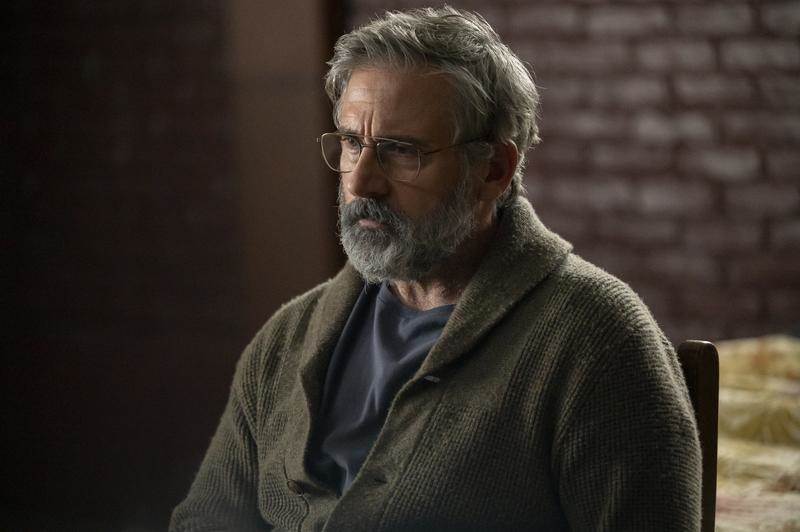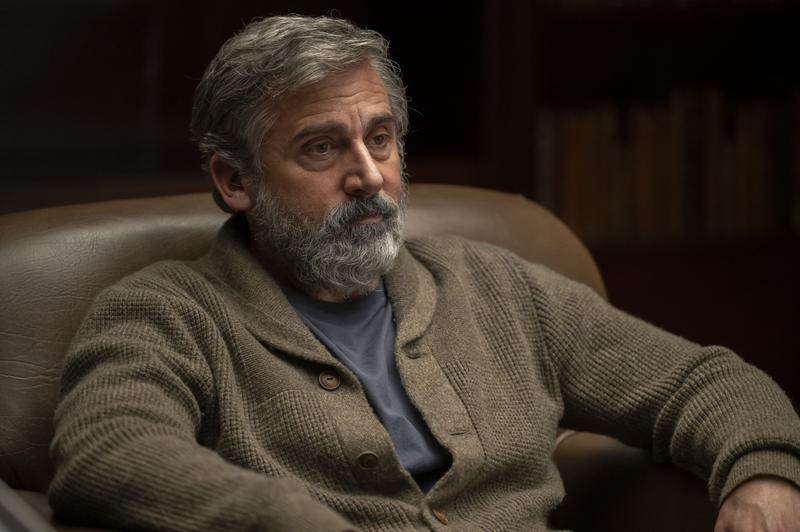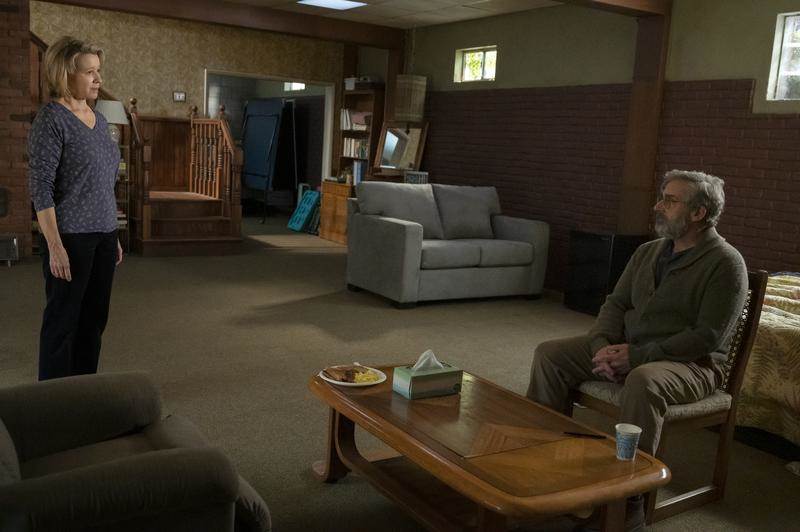It all ends here in a super-sized season finale of The Patient. FX’s hit drama from Joel Fields & Joe Weisberg has offered up one hell of a psychological thriller. We concluded with a recap of Episode 10, titled “The Cantor’s Husband.” As a refresher, when we last left Dr. Alan Strauss, his patient/captor had just left the house with the idea that he can fix everything by murdering his father.
“Candace!”, yells Dr. Alan Strauss (Steve Carell) from the basement where his ankle is chained to the floor. Sam’s mother rushes down, Candace (Linda Emond) staring blankly as Alan tells her what Sam is about to do. “Are you sure it won’t work?”, she asks.
Sam Fortner (Domhnall Gleeson) rings the doorbell at his father’s house, a man he hasn’t seen since his parents divorced. “Can I come in?”, he asks when his dad (Lance Guest) opens the door, nodding and stepping aside to let his estranged son enter. He asks Sam if he’s hungry. Cut to Sam finishing his Dinkin’ Donuts coffee and throwing it in the trash can while his dad chops lettuce for salads. He asks to use the bathroom and his dad directs him down the hall. Inside, Sam is careful to lift the toilet seat with his foot instead of his hands, not touching anything with his fingers.
Candace has brought down two big glasses of beer, one for her and one for Alan. She moves the La-Z-Boy so that she can stare out of the sliding glass doors to the backyard, anxious to find out what happened. She tells Alan that she’s been in this position before, knowing her son is out there committing murder and drinking to ease the anxiety. “You think I’m some sort of a monster, too, but I’m not,” she says, defending her compliance. She describes imagining the lives of Sam’s victims and what the families must go through each time. “But you won’t call the police, Candace, you won’t save them from this,” Alan accuses. “I can’t,” Candace confesses, starting to cry. Alan gets up and brings her the box of tissues, needing to extend his reach due to the chain that holds him captive.
Sam sits at a table with his father, who has made them both sandwiches. “Why’d you used tp hit me so much when I was a kid?”, Sam asks. His father lets out a sigh and confesses to not knowing. Sam asks him how it made him feel. “Bad, I guess,” he admits. “You were a weird kid. You couldn’t follow rules, you couldn’t play games, you didn’t have any friends. Your mother was reading all her books telling me it was my fault you were like that. Anyway, I’m sorry.” The apology comes across so quick and insincere that it ignites Sam’s rage. He lunges forward, knocking his father backward onto the floor. Sam mounts him, putting all his weight on his father’s chest as his hands wrap around his throat and begin to strangle him. His father kicks and chokes and struggles, eyes wide in horror. Something comes over Sam, who loosens his grip and stops. “My therapist said not to kill you,” he explains as his dad gasps for air.
“…And then I left,” Sam concludes telling Dr. Strauss about the event. “I was choking him, and I could feel him disappearing, and I stopped. It was like I didn’t want to.” He asks Alan why he didn’t do it and Alan answers the question with another question, asking what’s different about this time compared to all of the others. “Sam, you were on top of him, the one who treated you like this. If you killed him, you’d be doing it too. Acting just like him, being just like him. You hate that part of him.” Alan applauds this breakthrough for Sam, calling it “Extraordinary.” Sam gets emotional, his eyes tearing up from the praise. Sam gets up to get dinner, asking Alan what he would like, but Alan stops him. “Sam, it’s time to let me go home,” he announces. “You’re ready.” Alan tells Sam that he has his own struggles in life and needs to go have his own breakthrough, referring to his strained relationship with his son Ezra. He assures Sam that they can continue therapy, asking for daily sessions until the time is right and saying that patient/client confidentiality means Alan can’t report any past crimes and could only intervene in the event that he suspected Sam would cause harm again, which he doesn’t at this time.
That night, we see Sam lying awake in bed. Similarly, Alan is awake staring at Sam’s door. His gaze shifts to the sliding glass doors, seemingly dreaming of walking through them.
After eating breakfast with his mother, Sam goes to work. Alan hears the truck return that evening, followed by a few loud thumping sounds. The source of the sound is soon revealed when Sam pushes a dolly containing a couch into the basement, setting it up parallel to the bed. He exits one more time, returning with a black mini fridge. “I get what you’ve been saying,” Sam says. “I’ve been rushing you because I want to get better. But therapy takes time. Years, you said, sometimes. So, I’ll get a TV, and I can stock the fridge with anything you want.” Alan says nothing as Sam nods to himself and heads upstairs.
Alan closes his eyes and envisions a therapy session with his deceased therapist Charlie (David Alan Grier), who tells Alan that they both know how this ends. Sam needs a new father figure in his life and it will likely take ten years of consistency for him to feel comfortable enough to set him free. “Well, I’m not spending the next ten years down here,” Alan vows. “No, you’re not,” Charlie agrees.
Alan sits up and grabs his mini yellow legal pad and pen, sitting down in bed with them. He writes for a long time, using up all the pages. At last, he stops, smiling to himself. “A little mashugana, maybe,” he says to the void. Standing up, he calls for Sam, waking him up and motioning to the La-Z-Boy for a session. He announces that he will no longer treat Sam, saying that in his professional opinion, the only way for Sam to get better is for him to be physically stopped from hurting anybody else. “It’s time to turn yourself in, call the police and turn yourself in,” Alan instructs his patient. “Our therapy is over. You need to make a choice. I’m making one and you need to make one too. My choice is that I’m not doing therapy with you anymore. Your choice is you can turn yourself in, or you can end this the other way.” Sam tells Alan that he doesn’t want to do either of those options, standing up and going back to his room, closing the door. Alan sighs. Shortly after, Sam’s door opens and he leaves with his jacket and keys.
We see Sam sitting in his truck outside of the Lincoln County Police Department. He watches two police officers exit. He’s back home before breakfast, breaking his habit of entering through the basement and walking in through the front door. Candace serves him breakfast and seems to recognize that something is wrong.
“I know you want to go home, but he’s not ready,” Candace tells Alan when she brings him his breakfast. “Candace, this needs to end now,” Alan tells her, saying he doesn’t want to leave anything unsaid and acknowledging that he has something to say that will be hard for her to hear. “You did not protect your son,” he tells her about the abuse Sam endured as a child at the hand of his father. She shakes her head and starts to cry. Alan stands up and brings her the box of tissues. But as she moves close to take one, He grabs her, spinning her around and pulling her back to his chest. He presses the edge of the sharpened ointment tube he’s been working on for days to her neck and yells for Sam, who rushes down.
“I’m sorry to be in this position, I don’t want to do this,” Alan announces to Sam as he holds his mother with a sharp object against her neck, threatening to kill her if Sam doesn’t call the police right now and turn himself in. Sam is full of rage, telling his mother that Alan is bluffing. As Alan tries to talk, Sam screams at him because he said they can’t interrupt each other, calling back to an early basement session. “This is the only way out for you,” Alan announces. “This is the only way out for me. Make your choice.” Sam says no and Alan says then he will kill Candace and then Sam will kill him. “I don’t think you’re the kind of man who can even do it,” Sam calls Alan’s bluff. Alan presses the tube harder against Candace’s neck. She screams as he breaks skin.
Alan imagines he’s back at Auschwitz, seeing his wife Beth (Laura Niemi) about to take a gas chamber shower. He is awoken from the dream by one of his daughter-in-law Chava (Amy Handelman). His grandson, Menachem (Luke Dodge), asks what Alan’s nightmare was about. “I’ll tell you in about ten years,” Alan smiles as Ezra (Andrew Leeds) announces that dinner is ready. Ezra sits at the head of the table, Alan at the opposite end. It’s a joyous gathering, with Alan’s daughter Shoshana (Renata Friedman) and her husband and children present, too. They all begin singing a prayer, everyone smiling and laughing and feeling the love. And then Alan notices a strange sight… Charlie is sitting next to Ezra looking just as confused to be there as Alan is to see him.
“Oh, Sam,” Candace sobs from the floor where she clutches her neck, watching her son strangle the life out of his abducted therapist. Alan’s eyes have rolled back in his head and his body has gone still. Sam’s face is cold as he crawls off Alan’s body. He reaches in his pocket and withdraws the key to the ankle cuff, unlocking it. Opening the closet door, Candace watches as Sam drags Alan’s dead body in, closing the door behind him. He rolls Alan into the basement grave he helped dig for Elias. Sam sits down, looking at Alan’s face.
Sometime later, Sam exits the closet solemnly. Candace has gone upstairs and the basement is now empty. He picks up the ointment tube, the sharpened edge red with his mother’s blood. He brings it over to the nightstand where it was kept and notices something in Alan’s basin bowl. He pulls out the yellow mini legal pad and begins to read it.
Shoshana enters Alan’s house looking sad, holding a stack of mail. She pulls the rest of Alan’s backlog of mail out of a tray and takes it to the kitchen counter, where she begins sorting it. She stops at a thick envelope, deciding to open it and pulling out a letter. “Dear Children of Dr. Strauss,” it begins. The writer explains that Alan helped him out a lot and that he knows it’s important for Jewish people to have the body of their deceased loved ones. The letter gives the exact location of Alan’s buried remains and explains that the rest of the envelope's contents are for them. Shoshana pulls out the mini yellow legal pad and sits down to read it. “I want you to know I haven’t suffered and I’ve had a lot of time to think,” Alan’s letter reads, describing how Shoshana and Ezra brought joy and meaning to his life and their mothers’ too. The ink is smudged in some places from tear stains as Alan got emotional while writing. As the letter switches from Shoshana to Ezra, we see that Alan’s daughter has brought the letter to her brother’s house. Having run out of paper, Alan wrote on both sides of the cardboard back of the pad. “I understand everything that you said to me,” Alan’s note continues to his son, admitting to being judgemental and confessing his biggest regret, letting Beth take all the blame as she was dying. “I want you to know that I see this and I’m sorry. Through it all, I always loved you, and I want you to know how very much I respect who you are and the choices you’ve made.” Ezra drops the pad and sobs. He and his sister console each other.
The Fortner basement has been cleaned. The bed is made and the coffee table is cleared. Sam stares at the seat from which Alan conducted all of their basement sessions. We hear him say “I think I really changed. The therapy worked. I’m not going to do it again. I am never going to hurt anyone again.” Sam envisions Alan in the chair, who says “That’s not true. You’re going to do it again. We both know it.” Sam walks to the bed and sits down. Bending over, he picks up the ankle chain and clasps it around his own ankle. After locking it, he calls Candace down and holds out the key. She gets emotional, acknowledging what Sam is doing. She accepts the gift of his captivity.
Ezra sits in his first therapy session, asking his therapist (Mark Bloom) if he ever met his father. He says no, but that he read his book. “I never read it,” Ezra confesses. “I don’t even have a copy, but I think I’m about to inherit about three boxes of them.” His therapist shares that one of the chapters is about parenting and then asks Ezra how he’s doing. Ezra deflects, talking about how worried he is for his wife, children, and sister. His therapist has to work to get Ezra to say “It’s been hard, but I’m okay.” The therapist asks Ezra to open up more and talk about himself. “I’m not sure where to start,” the son of a psychiatrist says. “Really, anywhere is okay,” his therapist encourages. “I…”
The screen goes dark.
That’s the end of The Patient. I hope you’ve enjoyed these recaps. If you loved the show, I recommend watching it again on Hulu. I sat through the entire series twice to prepare each recap and there are a lot of nuances that are revealed on a second pass. And if you’re hungry for more great content from FX, the next series I’ll be providing detailed recaps for is the network’s adaptation of Fleischman is in Trouble, which begins November 17th on Hulu. I hope you’ll return for that series.



